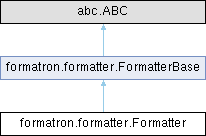
Public Member Functions | |
| __init__ (self, list[Extractor] extractors, kbnf.Engine engine, typing.Callable[[list[int]], str] decode_callback, str grammar_str) | |
| Initialize the formatter. | |
| kbnf.AcceptTokenResult | accept_token (self, int token_id) |
| Accept a token from the language model. | |
| kbnf.AcceptTokenResult | accept_bytes (self, bytes _bytes) |
| Accept a bytes object from the language model. | |
| None | compute_allowed_tokens (self) |
| Compute the allowed tokens based on the current state. | |
| typing.Any | mask_logits (self, logits) |
| Mask the logits based on the current state. | |
| typing.Sequence[int] | get_allowed_tokens_since_last_computation (self) |
Get the allowed tokens since the last computation(in other words, the last call to compute_allowed_tokens). | |
| bool | is_completed (self) |
| Check if the generation is completed. | |
| None | reset (self) |
| Reset the formatter to the initial state. | |
| __str__ (self) | |
Protected Member Functions | |
| str | _obtain_accepted_output (self) |
| None | _on_completion (self, str generated_output) |
| Perform actions when the generation is completed. | |
Protected Attributes | |
| _extractors | |
| _engine | |
| _token_id_or_bytes | |
| _decode_callback | |
| _grammar_str | |
| _captures | |
Properties | |
| grammar_str (self) | |
| Get the KBNF grammar string. | |
| dict[str, typing.Any]|None | captures (self) |
| Get the captures from the generated string. | |
Detailed Description
Definition at line 112 of file formatter.py.
Constructor & Destructor Documentation
◆ __init__()
| formatron.formatter.Formatter.__init__ | ( | self, | |
| list[Extractor] | extractors, | ||
| kbnf.Engine | engine, | ||
| typing.Callable[[list[int]], str] | decode_callback, | ||
| str | grammar_str ) |
Initialize the formatter.
- Parameters
-
extractors The matchers to extract data from the generated string. engine The KBNF engine to enforce the format. decode_callback The callback to decode the token IDs to a string. grammar_str The KBNF grammar string.
Definition at line 122 of file formatter.py.
Member Function Documentation
◆ __str__()
| formatron.formatter.Formatter.__str__ | ( | self | ) |
Definition at line 262 of file formatter.py.
◆ _obtain_accepted_output()
|
protected |
Definition at line 155 of file formatter.py.
◆ _on_completion()
|
protected |
Perform actions when the generation is completed.
Reimplemented from formatron.formatter.FormatterBase.
Definition at line 209 of file formatter.py.
◆ accept_bytes()
| kbnf.AcceptTokenResult formatron.formatter.Formatter.accept_bytes | ( | self, | |
| bytes | _bytes ) |
Accept a bytes object from the language model.
- Parameters
-
_bytes The bytes object.
Reimplemented from formatron.formatter.FormatterBase.
Definition at line 184 of file formatter.py.
◆ accept_token()
| kbnf.AcceptTokenResult formatron.formatter.Formatter.accept_token | ( | self, | |
| int | token_id ) |
Accept a token from the language model.
- Parameters
-
token_id The token ID.
- Returns
- The result of accepting the token.
Reimplemented from formatron.formatter.FormatterBase.
Definition at line 147 of file formatter.py.
◆ captures()
| dict[str, typing.Any] | None formatron.formatter.Formatter.captures | ( | self | ) |
Get the captures from the generated string.
Note that the captures are only available for one extractor if:
- The extractor has a capture name.
- Formatter.is_completed() returns True.
- The extractor successfully extracts the data.
- This means the extractor identifies the correct string span to extract and whatever post-processing the extractor does on the extracted string is successful.
Captures are obtained by calling Extractor.extract method on the generated string in the sequence of extractors appended to the formatter. Note that the previous extractors does not 'see' the semantics of the later extractors. For example, consider the following formatter: python @code f = FormatterBuilder() f.append_line(f"{f.regex('.*?', capture_name='a')}{f.regex('.*', capture_name='b')}") f = f.build() @endcode The b extractor will always corresponding to None because the a extractor will always extract the whole string. This behavior is different from what a typical regular expression engine would do!
Reimplemented from formatron.formatter.FormatterBase.
Definition at line 252 of file formatter.py.
◆ compute_allowed_tokens()
| None formatron.formatter.Formatter.compute_allowed_tokens | ( | self | ) |
Compute the allowed tokens based on the current state.
Reimplemented from formatron.formatter.FormatterBase.
Definition at line 192 of file formatter.py.
◆ get_allowed_tokens_since_last_computation()
| typing.Sequence[int] formatron.formatter.Formatter.get_allowed_tokens_since_last_computation | ( | self | ) |
Get the allowed tokens since the last computation(in other words, the last call to compute_allowed_tokens).
- Returns
- The allowed tokens.
Reimplemented from formatron.formatter.FormatterBase.
Definition at line 198 of file formatter.py.
◆ grammar_str()
| formatron.formatter.Formatter.grammar_str | ( | self | ) |
Get the KBNF grammar string.
Definition at line 142 of file formatter.py.
◆ is_completed()
| bool formatron.formatter.Formatter.is_completed | ( | self | ) |
Check if the generation is completed.
This means the generation is ended by the engine. If the generation is ended by integration-specific stop conditions like max_new_tokens, the generation is not considered completed by this method.
Reimplemented from formatron.formatter.FormatterBase.
Definition at line 206 of file formatter.py.
◆ mask_logits()
| typing.Any formatron.formatter.Formatter.mask_logits | ( | self, | |
| logits ) |
Mask the logits based on the current state.
- Parameters
-
logits The logits to mask.
- Returns
- The masked logits.
Reimplemented from formatron.formatter.FormatterBase.
Definition at line 195 of file formatter.py.
◆ reset()
| None formatron.formatter.Formatter.reset | ( | self | ) |
Reset the formatter to the initial state.
Reimplemented from formatron.formatter.FormatterBase.
Definition at line 257 of file formatter.py.
Member Data Documentation
◆ _captures
|
protected |
Definition at line 129 of file formatter.py.
◆ _decode_callback
|
protected |
Definition at line 127 of file formatter.py.
◆ _engine
|
protected |
Definition at line 125 of file formatter.py.
◆ _extractors
|
protected |
Definition at line 124 of file formatter.py.
◆ _grammar_str
|
protected |
Definition at line 128 of file formatter.py.
◆ _token_id_or_bytes
|
protected |
Definition at line 126 of file formatter.py.
The documentation for this class was generated from the following file:
- src/formatron/formatter.py